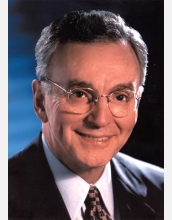News Release 05-107
Joseph Bordogna Resigns from the National Science Foundation
Was agency's longest-serving deputy director
June 28, 2005
This material is available primarily for archival purposes. Telephone numbers or other contact information may be out of date; please see current contact information at media contacts.
Dr. Joseph Bordogna will resign as deputy director of the National Science Foundation on June 30 after nine years in that office and will return to the University of Pennsylvania as Alfred Fitler Moore professor of engineering.Dr. Bordogna, who is also NSF's chief operating officer, is the longest-serving deputy director in the agency's history. He first came to the Foundation in 1991 as the head of NSF's Directorate for Engineering, and was appointed acting deputy director in 1996 by then-NSF Director Dr. Neal Lane. In 1999, he was named deputy director by President Clinton following Senate confirmation, and subsequently served with two NSF directors, Dr. Rita Colwell and Dr. Arden L. Bement, Jr.
Dr. Kathie L. Olsen, associate director for science for the Office of Science and Technology Policy in the Executive Office of the President, has been nominated to become NSF deputy director, pending confirmation.
"I am deeply honored to have had this opportunity to serve the nation and the science and engineering community," Dr. Bordogna said. "Helping ensure that NSF operates at the outermost frontiers of research and education is an exhilarating responsibility. And broadening participation within it is a wonderfully worthwhile investment for the future of our nation. I am fortunate to have been part of this integrative effort, along with many others, during my tenure at the Foundation. Sharing these tasks with the extraordinary NSF staff is an endless adventure, one with which I hope Vannevar Bush would be pleased."
Complementing his NSF duties, Dr. Bordogna is a member of the President's Management Council and has chaired interagency committees on manufacturing, environmental technologies, and automotive technologies within the president's National Science and Technology Council.
Dr. Bordogna received the B.S.E.E. and Ph.D. degrees from the University of Pennsylvania and the S.M. degree from the Massachusetts Institute of Technology. As well as his assignment at NSF, his career includes experience as a line officer in the U.S. Navy, an engineer in industry and a professor.
Prior to appointment at NSF, he served at the University of Pennsylvania as director of The Moore School of Electrical Engineering, dean of the School of Engineering and Applied Science, and faculty master of Stouffer College House, a living-learning student residence at the university.
He has made contributions to the engineering profession in a variety of areas including early laser communications systems, holographic recording and early space capsule recovery. He was a founder of PRIME (Philadelphia Regional Introduction for Minorities to Engineering) and served on the board of the Philadelphia Partnership for Education, community coalitions providing, respectively, supportive academic programs for K-12 students and teachers.
Dr. Bordogna is a fellow of the American Association for the Advancement of Science (AAAS), the American Society for Engineering Education (ASEE), the Institute of Electrical and Electronics Engineers (IEEE), and the International Engineering Consortium. He also served his profession globally as president of the IEEE.
-NSF-
Media Contacts
William C. Noxon, NSF, (703) 292-7750, email: wnoxon@nsf.gov
The U.S. National Science Foundation propels the nation forward by advancing fundamental research in all fields of science and engineering. NSF supports research and people by providing facilities, instruments and funding to support their ingenuity and sustain the U.S. as a global leader in research and innovation. With a fiscal year 2023 budget of $9.5 billion, NSF funds reach all 50 states through grants to nearly 2,000 colleges, universities and institutions. Each year, NSF receives more than 40,000 competitive proposals and makes about 11,000 new awards. Those awards include support for cooperative research with industry, Arctic and Antarctic research and operations, and U.S. participation in international scientific efforts.
Connect with us online
NSF website: nsf.gov
NSF News: nsf.gov/news
For News Media: nsf.gov/news/newsroom
Statistics: nsf.gov/statistics/
Awards database: nsf.gov/awardsearch/
Follow us on social
Twitter: twitter.com/NSF
Facebook: facebook.com/US.NSF
Instagram: instagram.com/nsfgov



